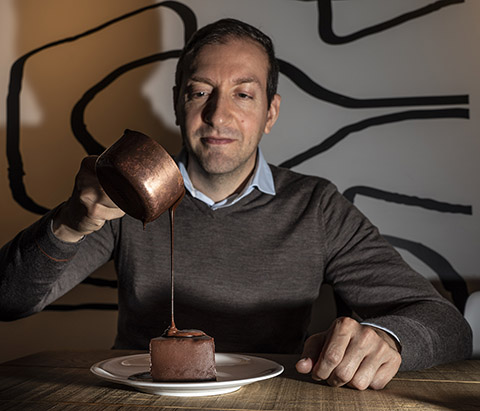
Elkan Akyürek researches superfoods
Boost your brain with chocolate
Elkan Akyürek loves chocolate. Especially the Tony Chocolonely the university board sent to the employees to hearten them during the pandemic. ‘It was delicious.’
And the adjunct-professor in cognitive neuroscience is not the only one. After all, who doesn’t like chocolate? Some scientists think it’s because of the mouthfeel: the sweetness, the softness, the melting sensation. Others say it’s the theobromine. This substance affects your central nerve system and makes you more alert, a bit like caffeine. Or it’s because of the flavanols in cacao: substances that make your blood vessels wider and improve the blood circulation in your brain.
Claims
One thing’s for sure: chocolate is considered a superfood. And that’s exactly what Akyürek focused on over the past few years. Do any of the claims you can read on all sorts of blogs make sense? The claim that gaba, a neurotransmitter you can buy as a food supplement at the drugstore, makes you calmer. Or that ginkgo biloba – from the bark of the ginkgo tree – improves your memory, and that chocolate makes you more alert?
After all, it’s not like you’re sniffing cocaine
Because although you do read a lot about it and there are scientific articles supporting such claims, Akyürek still had his doubts. ‘Most of these studies are based on standardised tests,’ he says. ‘I call them “solidified tests.” Counting back from a high number in leaps of three or seven for example. Pretty difficult and sometimes you do notice certain effects. But what are you actually measuring?’
And then there was the feeling that some researchers were reporting positive results a little too often. Were they, perhaps, sponsored by the industry, for whom large interests are at stake? ‘They’re vague suspicions, of course,’ he says. ‘But you still want to be above that.’
So, when Akyürek got started, he made sure he had his affairs in order. He registered his research before commencing, recorded what he wanted to examine to pre-empt any confirmation bias and afterwards, he shared the data.
Temporal attention
Meanwhile he’s performed two studies into chocolate. Or rather: into the flavanols in chocolate. These antioxidants – which can also be found in blue berries and red wine – are said to be able to boost your brain. But which part of your brain? Does it involve spatial attention – being able to quickly find something in a room – or do you get better at noticing things that happen shortly after each other?
‘You call this temporal attention and temporal integration,’ Akyürek says. ‘When something grabs your attention, you can’t pay attention to anything else properly in the thirty seconds after it. So for example, if your phone beeps because of the monthly NL-Alert, you don’t notice that your coffee was in the way when you went to pick up your phone. We call this the attentional blink.’
Hot chocolate
Akyürek wanted to know whether this attentional blink might be shorter with a large dose of chocolate flavanols in your body and that thus, you would notice more. For this, he treated 48 students to hot chocolate made of cacao powder. Sometimes there were no flavonols in it, sometimes a high dose and sometimes a low dose. Subsequently he let them perform computer tasks. In a fast sequence of letters they had to click on anomalous pictures – the corners of a square.
In the end however, the answer was somewhat disappointing: ‘No, we didn’t really measure any effect.’
He wasn’t expecting much of it though. ‘After all, it’s not like you’re sniffing cocaine. Even with caffeine, which is the strongest licensed product we know, the effects are more related to habituation, rather than actually making you that extra alert.’
Spatial memory
But then came another part of the study. This time, Akyürek wanted to measure whether spatial memory could be improved. The 48 students did a sort of extra boring version of Where’s Wally: they had to find the letter T on a screen full of L’s. Which all sounds a bit useless, but ‘your brain is doing the same thing as when you’re looking for your bag in a room’.
The effect might be even bigger in everyday life
And this time he did measure something. His test students found the letter T quicker and more effectively. In addition, they even succeeded in doing so with the modest dose of 4.5 grams of flavanol, an amount you can easily find in a regular bar of dark chocolate – the higher the percentage of cacao, the more flavanols.
‘That was pretty special, ‘ Akyürek says. ‘Particularly because you can often easily translate these types of lab results to everyday life. ‘And then the effect might even be bigger. It all stays a bit subtle during a lab test like this.’
So it’s perfect for your everyday life: for finding lost friends on Lowlands, for example, or finding your bike at the Academy building.
More insight
Unfortunately, it did stop there, says the researcher. This spring, he published a study on the influence chocolate flavanols have on the visual working memory: how well you can remember things. This time, under the influence of hot chocolate, students had to imprint striped circles in their memory and, over time, reproduce how slanted the stripes were. As with the temporal tasks, he found no effect.
A pity?
Absolutely not, he says. He demonstrated that flavanols actually do have an effect. And although they don’t make your entire brain more alert or keen, we have gotten more insight into how this brain boost actually works.
Besides, he’s not done yet. He still wants to take a look at coffee beans cooked in chocolate: then you combine caffeine and flavanols. That might produce something. Or he will continue with just chocolate. ‘But if I do, I want to look at other cognitive features.’